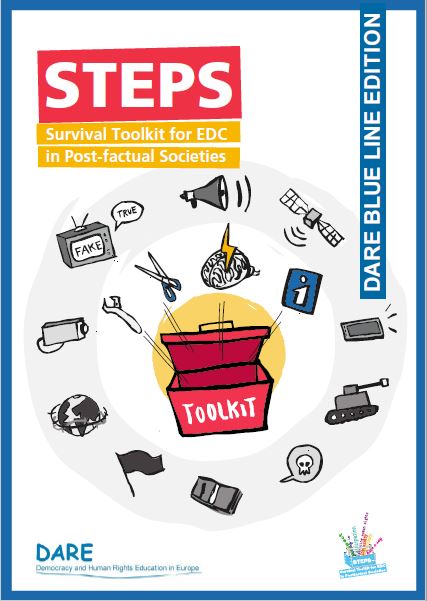Contents
Goals
- Understanding stereotypes mechanisms in society and mediating the process of prejudice building that can lead to hate speech both online and in real life
Steps
1. Trainer introduces the activity as a roleplay based on a real situation.
2. Trainer takes two participants out from the classroom, gives them a scarf to wear and asks them to wait outside with the following instructions.
- “You are a couple searching for an apartment. Currently you have no place to live and you need to find an apartment quickly. You are decent citizens, you both have jobs and enough money to pay both rent and deposit. Your aim is to act polite to get an apartment. You will meet several apartment owners and your task is to convince them to rent you their apartment.”
3. Meanwhile the group of participants in the classroom are divided into groups as described below. Trainer explains groups:
- "You are apartment owners offering an apartment for rent and that a couple asking for an apartment will come but they cannot rent them the apartment. The reason is the scarf the couple are wearing but at the same time, this reason cannot be admitted to the couple."
- Participants that stay as observers are instructed not to interact during the activity.
Groups of apartment owners
Group 1 (3-5 people)
Apartment owners – family in debt, in desperate need of money
Group 2 (2 people)
Apartment owners – older childless couple with a dog, neither of them have ever been abroad
Group 3 (3-5 people)
Apartment owners – a family with small children, the women is on maternity leave, the man is working
Group 4 (3-5 people)
Apartment owners – football fans, only go along with people who are football fans as well
Group 5 (2 people)
Apartment owners – young university students renting an inherited apartment
4. When the roles are clear, participants with the scarf enter the classroom and the roleplay starts trying to find someone who would rent them an apartment.
- It is advised to let the activity go on for a little while until the couple with the scarf have asked almost everyone, even repeatedly.
- Trainers can stop the activity when the dynamics are stopping or when the point has been made (couple understands that nobody will rent the apartment).
5. To close the roleplay make a specific activity taking your time to take everybody out of their roles and back as participants.
Reflection
4. Go back to the circle to debrief the activity. Start with the couple searching for the apartment and give them space to share their feelings and express their experience.
With all groups focus on two aspects:
- What actually happened
- Feelings of participants.
Observers can support with an external view on facts and the different emotions they recognized.
Suggested questions for the couple:
- How did you feel?
- What was surprising?
- Do you think this situation can actually happen?
- What was difficult for you the most?
Suggested questions for the apartment owners:
- How did you feel in your position?
- What was the most difficult for you?
- How did you feel when you couldn’t tell the reason?
Transfer
- What in real life is the scarf symbolizing?
- Do you have any personal experience with similar situation?
- What is discrimination?
- Which group could be discriminated and why?
- How does discrimination look like in reality?
It is useful to write students answers on the board and use it to clarify data about discrimination in the region/country.
Reference
- DARE network: Survival Toolkit for EDC in Post-factual Societies
TIPS FOR FACILITATORS
Trainer shouldn’t choose participants with aby possible experience with discrimination or hate speech. Students chosen to leave the class should be strong opinion makers in the group that is capable to manage a potentially negative situation. It might be useful to know the group in advance. The scarf (or any other accessory) should be chosen in a way that no similarities with religion or ethnical symbol could be found. Trainer can check with the groups that they developed some argumentation towards the couple, in case group cannot figure out any substitute arguments, trainer can help them.





